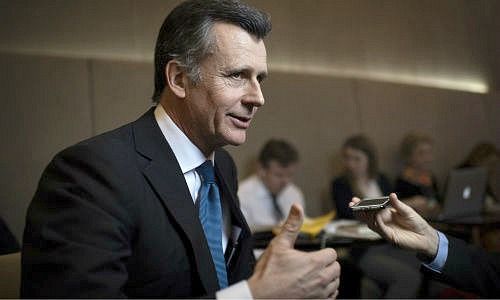The global economy is looking increasingly troubled – and central banks are out of ammo. Switzerland's former top central banker Philipp Hildebrand suggests a radical remedy.
If Philipp Hildebrand has his way, its about to rain money on Europe's companies and consumers – that's the gist of a position paper authored by the former Swiss National Bank head and colleagues at Blackrock, the world's largest asset manager.
The paper, released to coincide with a confab of the world's top central bankers next week in Jackson Hole, WY, outlines potential solutions against a looming recession. Central bankers have so generously dosed monetary policy since the financial crisis of 2008/09 to hotwire growth that they have little room to maneuver left.
Hotwiring Consumption
«Really there is very little if any ammunition left», Hildebrand said in an interview (see below) with «Bloomberg» on policies that are keeping interest rates ultra-low or in negative territory. «More of the same in terms of monetary pol is unlikely to be an appropriate response if we get into a recession or sharp slowdown.»
It's about «going direct» with money to consumers and companies in order to enliven consumtion, he said: In other words, finding ways of putting money to spend directly into their pockets, and circumventing the interest rate channel.
The proposal by Hildebrand and his colleagues blurs the lines between monetary and fiscal policy, which generally operate largely independently. The paper was lead-written by Blackrock economistHelga Bartsch, with Hildebrand, and Stanley Fischer andJean Boivin, former central bankers in Israel and Canada, respectively.
Helicoptering Money
«You have to go a different way than the interest rate channel because interest rates are already so low,» Hildebrand said. «And that means inevitably you will see a much closer coordination between fiscal and monetary policy as a critical element of such a next policy regime.»
He didn't deny that this effectively represents so-called helicopter money, or dramatically increasing money supply. Blackrock calls this a «standing emergency fiscal facility»: a permanent reserve which kicks in when monetary policy is exhausted, but inflation is expected to undershoot its target.
Christine Lagarde: Ideal Candidate
Who gets a piece of this money and how much would be decided by «independent experts». They should hew to a political consensus – though a large part of Europe has been unwilling to jumpstart growth in the bloc with methods like these.
Hildebrand views Europe as the guinea pig for the proposal, and views the planned move by Christine Lagarde from the International Monetary Fund to the European Central Bank as fortuitous.«If we go into this world where fiscal and monetary policy inevitably become blurred, one has to deal with how we operate,» Hildebrand said. «If we go into that kind of policy regime, Christine Lagarde is ideally qualified.»


































